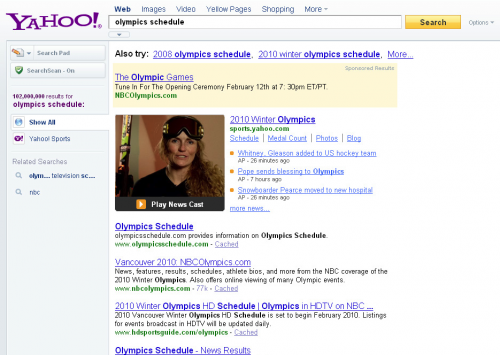Yahoo Search: This Is The “Dark Time” But We’ll Be Back
Yesterday Yahoo hosted a press event called SearchSpeak that sought to dispel the “misconception,” in the words of new Search Products SVP Shashi Seth, that Yahoo was no longer investing in search. As Seth took the stage to begin his presentation the power in the room went out. Not a very auspicious start to the […]
Yesterday Yahoo hosted a press event called SearchSpeak that sought to dispel the “misconception,” in the words of new Search Products SVP Shashi Seth, that Yahoo was no longer investing in search. As Seth took the stage to begin his presentation the power in the room went out. Not a very auspicious start to the day, it seemed symbolic of Yahoo’s new difficulties and challenges in search.
Attempting to generate enthusiasm, he pressed on without slides: despite the popular misconception, Yahoo is not out of search, echoing statements made by CEO Carol Bartz and others on past company earnings calls. He would not have come to Yahoo six weeks ago if the company wasn’t committed to search and there wasn’t a great team there, and so on.
The power came back on and Seth was able to show his slides. There’s lots of innovation on the front end and with the user experience still to be done. The purple boxes below indicate Yahoo’s “contribution” to search after the Microsoft deal closes.
Seth then spoke at some length about Yahoo’s leadership in Asia and its mobile OEM and operator relationships in mobile around the globe.
Prabhakar Raghavan, SVP, Yahoo Labs/Search Strategy came next to again express the concept of the “web of things” vs. the “old” idea of the “web of objects” (documents). People don’t care about the index size anymore; they care about the right information or “answer.” He made the remark that 99 percent of search queries on Yahoo “have a noun” in them. This indicates that people are looking for information about the real world. The era of 10 blue links is dead, and so on.
Raghavan went on to detail Yahoo’s formidable academic and research successes: the top three texts about search are all by Yahoo scientists; the top prizes (papers) at all the 2009 and now 2010 (so far) data mining conferences have been won by Yahoo.
Larry Cornett, VP Consumer Products took the stage and reviewed many of the search innovations and rollouts of the past six months: Search Assist, Search Pad, breaking news/Twitter, richer Shortcuts, contextually relevant filters and refinements, multimedia search, etc. Cornett also previewed some future innovations and tools coming.
Cornett showed “search a sketch,” a novel mobile search tool enabling users to draw custom area on a smartphone map and search within that area. Similar to Yahoo Local’s radius search online, it was an impressive. He explained philosophically that Yahoo would take a very different approach in mobile vs its competitors who are largely reproducing the PC experience on smartphones.
David Pann, Search Advertising VP ended the formal part of the meeting with discussion of some improvements on that side of the house, including a Google campaign import tool.
At the end of the presentations, I had the feeling that “we’ve heard much of this before” and got the sense that much of the audience remained unconvinced that Yahoo would continue to be competitive in search. However the Q&A portion of the discussion and the informal lunch discussions thereafter were both useful and more convincing.
Candidly Seth acknowledged the search share losses that comScore and Hitwise have reported. He attributed some of those losses to toolbar and default search deals that Yahoo no longer had or that others had aggressively grabbed away. Overall I was impressed with the candor and frankness of Yahoo’s discussion in response to question after question that in one way or another was highly skeptical of Yahoo’s prospects — including mine.
I said: “many in this audience want Yahoo to be competitive and succeed but remain skeptical that you can.” Larry Cornett responded that he was at Apple during the “dark time” before the return of Steve Jobs, when critics were calling for the company to shut down. He likened the media perceptions of Yahoo Search now to that period in Apple’s history and promised that Yahoo Search would “be back.” He added that many of Yahoo’s innovations were being freely copied by its competitors but in more superficial ways.
At the end of Q&A other Yahoo research scientists were introduced:
- Yoelle Maarek, Senior Director at Yahoo Research in Israel
- Ricardo Baeza-Yates, VP of Research for Europe and Latin America
- Preston McAfee, VP and Research Fellow at Yahoo Research in Burbank, CA
I spoke at some length with Maarek, who was previously at Google. She contrasted the environments and spoke about why she left Google and came to Yahoo. She spoke about greater openness and “humility” at Yahoo and of the opportunity to work with the Yahoo Research team, which she greatly respected. I also spoke a bit with Tim Mayer, who remains at Yahoo and expressed confidence in the product and the team.
I came away from the Q&A and these more informal discussions much more “convinced” than during the formal presentations that Yahoo would in fact continue to innovate and would retain and perhaps gain new search talent. The challenge is resources and mindshare, given how Google dominates the news with each (almost daily) product announcement.
But it would appear that Yahoo will continue to do interesting and innovative things in search — and the industry wants and needs them to.
Opinions expressed in this article are those of the guest author and not necessarily Search Engine Land. Staff authors are listed here.
Related stories
New on Search Engine Land



